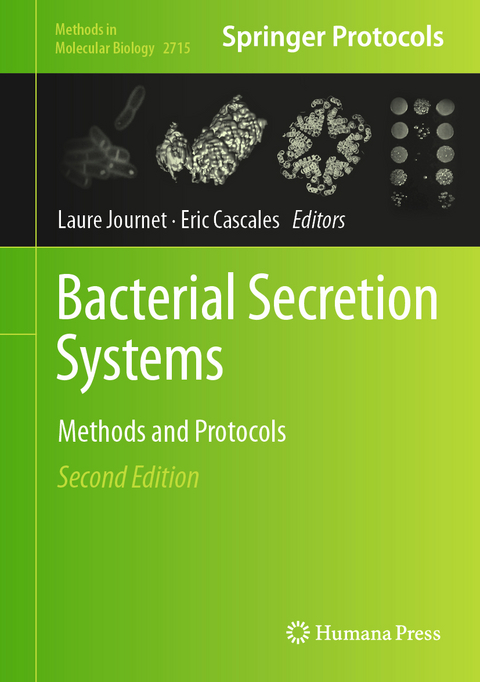
Bacterial Secretion Systems
Springer-Verlag New York Inc.
978-1-0716-3444-8 (ISBN)
Authoritative and cutting-edge, Bacterial Secretion Systems: Methods and Protocols- Second Edition aims to be a useful and practical guide to new researchers and experts looking to expand their knowledge.
lt;p>1 Identification of protein secretion systems in bacterial genomes using MacSyFinder version 2
Sophie S Abby, Rémi Denise, and Eduardo PC Rocha
2 Protein sorting prediction
Henrik Nielsen
3 Cell fractionation
Melissa Petiti, Laetitia Houot, and Denis Duché
4 Components sub-cellular localization: identification of lipoproteins using globomycin and radioactive palmitate
Nienke Buddelmeijer
5 Components sub-cellular localization: identification of lipoproteins using alkyne fatty acids and click-chemistry
Karine Nozeret, and Nienke Buddelmeijer
6 Defining membrane protein localization by isopycnic density gradients
Rhys A. Dunstan, Iain D. Hay, and Trevor Lithgow
7 Components sub-cellular localization: Cell surface exposure
Anna Konovalova
8 Probing protein topology and conformation by limited proteolysis
Maïalène Chabalier, Thierry Doan, and Eric Cascales
9 Exploring uniform, dual and dynamic topologies of membrane proteins by substituted cysteine accessibility method (SCAMTM)
Mikhail Bogdanov
10 Preparation of uniformly oriented inverted inner (cytoplasmic) membrane vesicles from Gram-negative bacterial cells
Mikhail Bogdanov
11 Defining membrane protein topology using pho-lac reporter fusions
Gouzel Karimova, and Daniel Ladant
12 Measure of peptidoglycan degradation activity
Yoann G. Santin, and Eric Cascales
13 Protein-protein interaction: Bacterial Two-Hybrid
Gouzel Karimova, Emilie Gauliard, Maryline Davi, Scot P. Oulelette, and Daniel Ladant
14 Protein-protein interactions: oxidative Bacterial Two-Hybrid
Callypso Pellegri, Emmanuelle Bouveret, and Laetitia Houot
15 Protein-protein interactions: Yeast two-hybrid
Jer-Sheng Lin, and Erh-Min Lai
16 Protein-protein interactions: Bimolecular Fluorescence Complementation and Cytology two-hybrid
Dvuti Purkait, Mohd Ilyas, and Krishnamohan Atmakuri
17 Bacterial one- and two-hybrid assays to monitor transmembrane helix interactions
Abdelrahim Zoued, Jean-Pierre Duneau, and Eric Cascales
18 Protein-protein interactions: Co-immunoprecipitation
Jer-Sheng Lin, Jemal Ali, and Erh-Min Lai
19 Protein-protein interaction: Tandem Affinity Purification in bacteria
Julie P. M. Viala, and Emmanuelle Bouveret
20 In vivo site-directed and time-resolved photocrosslinking of envelope proteins
Yassin A. Abuta'a, Anne Caumont-Sarcos, Cécile Albenne, and Raffaele Ieva
21 Identification of protein partners by APEX2 proximity labeling
Ophélie Remy, and Yoann G. Santin
22 Blue native PAGE analysis of bacterial secretion complexes
Susann Zilkenat, Eunjin Kim, Tobias Dietsche, Julia V. Monjaràs Feria, Claudia E. Torres-Vargas, Mehari Tesfazgi Mebrhatu, and Samuel Wagner
23 Surface Plasmon Resonance: a sensitive tool to study protein-protein interactions
Badreddine Douzi
24 Defining assembly pathways by fluorescence microscopy
Andreas Diepold
25 Large complexes: cloning strategy, production and purification
Samira Zouhir, Wiem Abidi, and Petya V. Krasteva
26 Starting with an integral membrane protein project for structural biology: production, purification, detergent quantification and buffer optimization - case study of the exporter CntI from Pseudomonas aeruginosa.
Maxime Mégret-Cavalier, Alexandre Pozza, Quentin Cece, Françoise Bonneté, Isabelle Broutin, and Gilles Phan
27 Structural analysis of protein complexes by cryo electron microscopy
Athanasios Ignatiou, Kévin Macé, Adam Redzej, Tiago R. D. Costa, Gabriel Waksman, and Elena V. Orlova
28 CryoEM data analysis of membrane proteins. Practical considerations on amphipathic belts, ligands and variability analysis
Alexia Gobet, Loïck Moissonnier, and Vincent Chaptal
29 Structural analyses of bacterial effectors by X-ray crystallography
Chloé Dugelay, Virginie Gueguen-Chaignon, and Laurent Terradot
30 Structural analysis of proteins from bacterial secretion systems and their assemblies by NMR spectroscopy
Gisele Cardoso de Amorim, Benjamin Bardiaux, and Nadia Izadi-Pruneyre
31 Quantifying substrate protein secretion via the type-III secretion system of the bacterial flagellum
Rosa Einenkel, Manuel Halte, and Marc Erhardt
32 Use of Bastion for the identification of secreted substrates
Jiawei Wang, Jiahui Li, and Christopher J. Stubenrauch
33 Identification of effectors: Precipitation of supernatant material
Nicolas Flaugnatti, and Laure Journet
34 Metabolic labelling: snapshot of the effect of toxins on the key cellular processes
Dukas Jur nas
35 Effector translocation assay: differential solubilization
Irina S. Franco, Sara V. Pais, Nuno Charro, and Luís Jaime Mota
36 Monitoring effector translocation with the TEM-1 beta-lactamase reporter system: from endpoint to time course analysis
Julie Allombert, Anne Vianney, and Xavier Charpentier
37 Quantitative determination of anti-bacterial activity during bacterial co-culture
Juliana Alcoforado Diniz, Christopher Earl, Ruth E. Hernandez, Birte Hollmann, and Sarah J. Coulthurst
38 Investigating secretion systems and effectors on Galleria mellonella
Antonia Habich, and Daniel Unterweger
| Erscheinungsdatum | 08.11.2023 |
|---|---|
| Reihe/Serie | Methods in Molecular Biology |
| Zusatzinfo | 97 Illustrations, color; 23 Illustrations, black and white; XVI, 613 p. 120 illus., 97 illus. in color. |
| Verlagsort | New York, NY |
| Sprache | englisch |
| Maße | 178 x 254 mm |
| Themenwelt | Naturwissenschaften ► Biologie ► Mikrobiologie / Immunologie |
| Schlagworte | Cell fractionation • Fluorescence Microscopy • Isopycnic Density Gradients • Lipoprotein Localisation • Proteolysis |
| ISBN-10 | 1-0716-3444-5 / 1071634445 |
| ISBN-13 | 978-1-0716-3444-8 / 9781071634448 |
| Zustand | Neuware |
| Haben Sie eine Frage zum Produkt? |
aus dem Bereich


